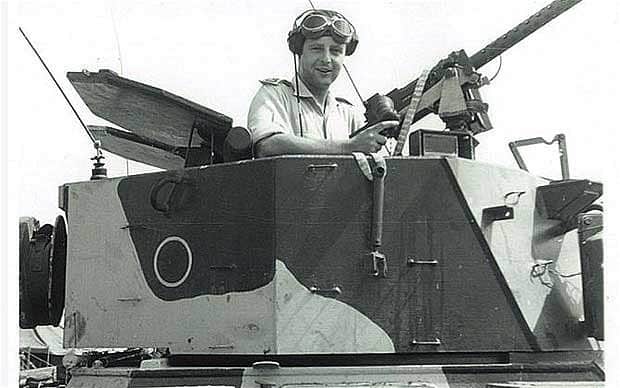Captain Richard Vaughan-Griffith, was awarded an MC in Aden in 1967 whilst serving with The Queen’s Own Hussars.
In September 1967 Britain was in the process of withdrawing from Aden, where its soldiers were subject to persistent attacks from the National Liberation Front. ‘C’ Squadron, The Queen’s Own Hussars (QOH) was supporting a battalion of the Parachute Regiment and the Lancashire Regiment. On the morning of September 8, a 14-man patrol of the Lancashire Regiment was ambushed at Al-Mansoura, in the north of Aden, and forced to take cover in two houses.
They were pinned down by intensive machine gunfire from surrounding buildings. Their radio had been hit, communication with their company base was lost, and two men were wounded.
Vaughan-Griffith, in command of a half troop of the QOH, advanced his Saladin armoured car in support but struggled to identify the buildings in which the beleaguered patrol had taken cover; when an infantryman poked a beret out of a window on the end of a stick he was able to pinpoint their position. Heavy fire was coming in from 10 different locations.
The rules of “minimum force” forbade him from using his main armament but by returning fire with his Browning machine guns he kept his adversaries’ heads down. Having established that the Lancashires were in two groups he called up a Saracen armoured personnel carrier (APC) from the local jail, which served as their base.
He ordered the APC to reverse up to the house which held half the patrol, including the two casualties and, while they were escaping into the rear of the vehicle, positioned his two armoured cars in the line of fire to act as a shield. His small force was then highly vulnerable to surprise, short-range attacks with bazookas, a weapon with which the attackers were well supplied, or to having grenades lobbed into their turrets.
Having extracted the first group and delivered them safely to the jail, he returned and rescued the remainder from another building employing the same tactics. The citation for the award of an MC stated that despite knowing of the hazards he faced, Vaughan-Griffith had been determined to rescue the infantrymen before they suffered further casualties and had shown “outstanding courage”. Six of the enemy were reported killed and seven wounded during the course of the two-hour action.
Richard Derek Lloyd Vaughan-Griffith was born in Jhansi, India, on December 15 1945. His father served in Probyn’s Horse and transferred to the British Army upon India being granted Independence.
Richard was educated at Framlingham College, where he excelled on the sports field, before going to Sandhurst. In 1966, he was commissioned into the QOH, which was preparing for an active service tour in Aden.
The streets there comprised a high proportion of dirt roads, which made them ideal for laying mines, and a few weeks after the action for which Vaughan-Griffith was awarded an MC, his Saladin passed over an anti-tank mine.
The explosion blew off a front wheel, disabling it and injuring his driver and gunner. Despite being stunned, Vaughan-Griffith helped his injured crewmen into the back of an accompanying APC while under fire. He then retrieved his camera from the Saladin and calmly photographed the damage before taking cover inside the Saracen.
After service in Aden, Hong Kong and Germany, Vaughan-Griffith was posted to Sandhurst as an instructor. He returned to the QOH as adjutant but, in 1975, resigned his commission and embarked on a career in the security business.
He started in Brinks Mat and was subsequently involved in negotiations to obtain the release of victims of kidnapping on behalf of the Lloyds of London insurance market. In 1992, he formed MacIvor Grant which expanded into a global risk management consultancy.
Settled in Hampshire, he kept up with his old regimental friends and organised so-called “Rocking Horse Lunches”, an irreverent reference to the White Horse of Hanover cap badge of the QOH.
Richard Vaughan-Griffith married first (dissolved) Jan Halliley, with whom he had a son and a daughter. He married, secondly, Jennifer Young. They all survive him.
Richard Vaughan-Griffith, born December 15 1945, died January 4 2012


